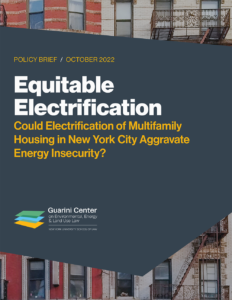Progressive cities and states have begun enacting policies to reduce greenhouse gas emissions from buildings, one of the leading sources of such emissions in the United States. The same jurisdictions have also generally committed to pursuing decarbonization equitably, without exacerbating the disadvantages faced by historically marginalized communities. Electrification is currently a favored policy for decarbonizing buildings.
This policy brief examines the potential for building electrification to impact tenant energy costs through a case study of New York City, focusing on whether there are gaps in current protections for low- and moderate-income tenants, and whether owners are likely to electrify their properties under the current policy framework.
